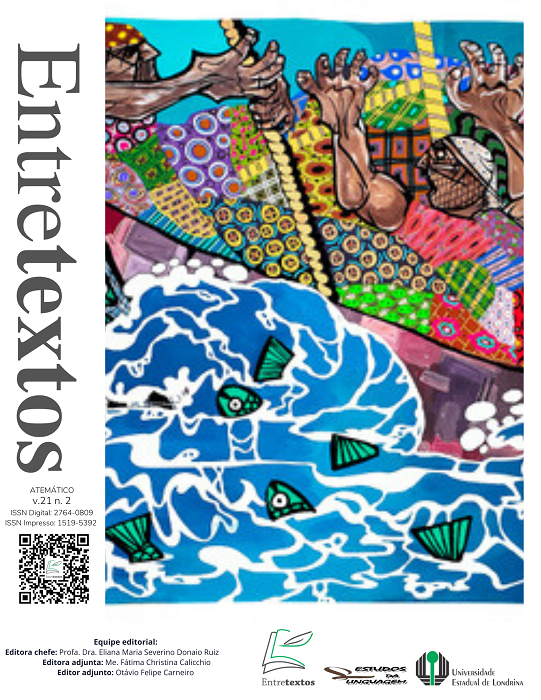Hybrid learning and virtual learning environment in English classes: the perspective of technical high school students
DOI:
https://doi.org/10.5433/1519-5392.2021v21n2p133Keywords:
Hybrid learning, Virtual learning environment, Educational applicationsAbstract
This research aims to create intelligibility on the introduction of hybrid learning in the teaching of English at a public technical high school. The pedagogical proposal included daily exercises on educational applications and some specific tasks to review and deepen the content posted periodically on a virtual learning environment. Thus, the theoretical foundation covers the following themes: hybrid teaching (BACICH; MORAN, 2015; GARRIDO, 2009; GEBRAN, 2009; MORAN, 2015), virtual learning environments (DILLENBOURG; SCHNEIDER; SYNTEKA, 2002) and learning management system (BERKING; GALLAGHER, 2016). In order to investigate the use and evaluation of online resources integrated to the discipline from students' perspective, an ethnographic case study was conducted (ANGROSINO, 2005; HARRIS, 2008; YIN, 2009) based on the data generated by face-to-face interviews and content registration (activities and resources) from the virtual learning environment. The results indicate students evaluate hybrid teaching positively but prefer to do the tasks posted on the virtual learning environment rather than the daily exercises on educational applications.Downloads
References
BACICH, L.; MORAN, J. Aprender e ensinar com foco na educação híbrida. Revista Pátio, [s. l.], n. 25, p. 45-47, jun. 2015. Disponível em: http://www2.eca.usp.br/moran/wp-content/uploads/2015/07/hibrida.pdf. Acesso em: 07 jan. 2019.
BARDIN, L. Análise de conteúdo. Lisboa: Edições 70, 2009.
BERKING, P.; GALLAGHER, S. Choosing a learning management system. Advanced Distributed Learning (ADL), 16 Dec. 2016. Disponível em: www.adlnet.gov/wp-content/uploads/2013/05/Choosing_an_LMS.pdf. Acesso em: 14 jan. 2019.
DENZIN, N.; LINCOLN, Y. A disciplina e a prática da pesquisa qualitativa. In: DENZIN, N.; LINCOLN, Y. (org.). O planejamento da pesquisa qualitativa: teorias e abordagens. Porto Alegre: Artmed, 2006. p. 15-41.
DILLENBOURG, P.; SCHNEIDER, D.; SYNTEKA, P. Virtual Learning environments. In: HELLENIC CONFERENCE "INFORMATION & COMMUNICATION TECHNOLOGIES IN EDUCATION", 3., 2002, Grécia. Proceedings […]. Grécia: Kastaniotis Editions, 2002. p. 3-18.
GARRIDO, S. M. L. Planejamento. Curitiba: IESDE Brasil, 2009.
GEBRAN, M. P. Tecnologias educacionais. Curitiba: IESDE Brasil, 2009.
HARRIS, L. R. A Phenomenographic investigation of teacher conceptions of student engagement in learning. Australian Educational Researcher, [s. l.], v. 35, n. 1, p. 57-79, 2008. Disponível em: http://www.eric.ed.gov/ERICWebPortal/contentdelivery/servlet/ERICServlet?accno=
EJ793463. Acesso em: 22 jun. 2019.
MORAN, J. Educação híbrida: um conceito-chave para a educação, hoje. In: BACICH, L.; NETO, A.; TREVISANI, F. (org.). Ensino híbrido: personalização e tecnologia na educação. Porto Alegre: Penso, 2015.
SANTAELLA, L. A aprendizagem ubíqua substitui a educação formal? Revista de Computação e Tecnologia, São Paulo, v. 2, n. 1, p. 1-6, 2010. Disponível em: http://revistas.pucsp.br/index.php/ReCET/issue/view/223/showToc. Acesso em 22 jun. 2019.
VYGOTSKY, L. S. Interação entre aprendizado e desenvolvimento. In: VYGOTSKY, L. S. A formação social da mente: o desenvolvimento dos processos psicológicos superiores. São Paulo: Martins Fontes, 1999.
YIN, R. K. Case study research: design and methods. London: SAGE, 2009.
Downloads
Published
How to Cite
Issue
Section
License
Copyright (c) 2021 Entretextos

This work is licensed under a Creative Commons Attribution 4.0 International License.
Entretextos adota a Licença Creative Commons Attribution 4.0 International, portanto, os direitos autorais relativos aos artigos publicados são do/s autor/es.
Sob essa licença é possível: Compartilhar - copiar e redistribuir o material em qualquer suporte ou formato. Adaptar - remixar, transformar, e criar a partir do material, atribuindo o devido crédito e prover um link para a licença e indicar se mudanças foram feitas.























